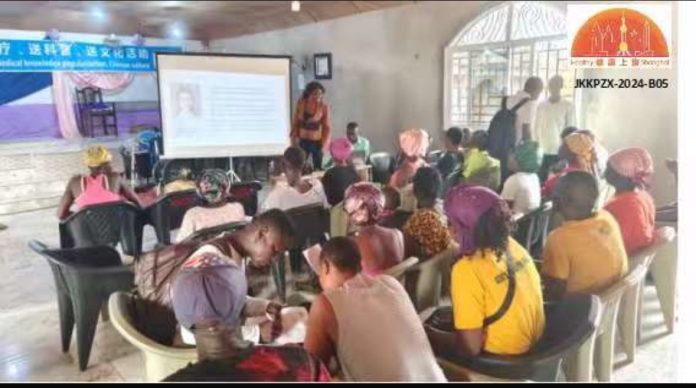“Sitting feels like perching on a cactus!” “Your belly becomes a deflated balloon!” — These vivid metaphors from Shanghai, China, drew resonant laughter and sighs from young mothers in Sierra Leone’s Kushiam community. On May 28, a unique science lecture took place here. Titled Postpartum Care and Recovery, the session was guided by Chinese doctor Ma Jueand delivered by local midwife volunteers. For the first time, systematic Chinese postpartum recovery principles were introduced to West Africa, attracting over 100 expectant mothers and family members.
The lecture content originated from the Shanghai Health Science Project Belt and Road Health Promotion: A Guide to Postpartum Vitality Recovery. Volunteers used illustrated handouts to translate “Chinese experience” into practical guidance:
Replacing traditional herbal poultices with “gentle rinsing using cooled boiled water”;
Demonstrating “queen-style breastfeeding posture” (with lumbar support) and “weightlifting-style holding” to prevent back pain;
Promoting “morning warm water + high-fibre diet” and emphasising “forward-leaning squatting” to relieve constipation. These approaches helped the audience easily grasp scientific recovery methods.
“Our ancestors focused solely on the baby’s health—mothers’ pain was often ignored,” shared Fatima, holding her three-month-old infant. “No one ever told us that perineal pain could be eased with cold compresses, or that back pain requires core muscle exercises!” During the Q&A session, questions about C-section scar recovery and self-checking for diastasis recti (abdominal muscle separation) drew intense interest. Dr. Ma Jue’s team patiently addressed each concern amid a lively atmosphere.
In Sierra Leone and across Africa, holistic postpartum recovery has long been neglected. Traditional views treat childbirth as a natural process, leaving mothers to resume heavy labor without guidance, leading to chronic back pain and pelvic floor disorders. This lecture innovatively adapted China’s “scientific postpartum confinement” principles into actionable recovery modules. “This isn’t about copying China’s model—it’s about localising knowledge,” emphasisedDr. Ma Jue in a transcontinental interview. “We tailored our materials to promote proactive recovery, showing mothers they don’t need to endure pain silently.”
Notably, the lecture coincided with a medical outreach, highlighting the multidimensional nature of China’s health aid to Africa. A community leader remarked: “Chinese doctors don’t just fight infectious diseases; they care about women’s lifelong health. This compassion is exactly what we need!”
As the first trained midwives begin sharing this knowledge locally, a China-African postpartum recovery guide is taking shape. As the lecture concluded, “Postpartum recovery is a marathon.” Along this health Silk Road paved by science and empathy, African mothers are now running with greater dignity.

